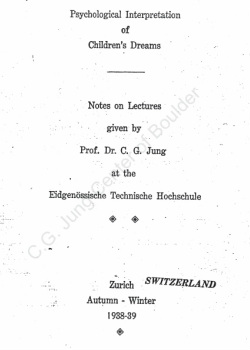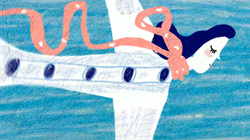|
1/31/2014 0 Comments What is Perception?I consider perception as sensation plus meaning — already a mixture of more than one function. Thus to me, perception describes a complex mode of human functioning in which an individual pays attention to certain stimuli arising from the sense organs or brain and ignores other ones, regardless of whether the paid-attention-to arises through sensation or intuition as understood through the Jungian or Myers-Briggs grid. As I conceive it, human perception presupposes a considerable amount of unconscious ordering and rejection prior to its awareness.
"Dictionary of Analytical Psychology" – Copyright 2006-2014 Robert Winer, M.D. Version Date: 01/31/2014
0 Comments
4/17/2013 0 Comments Art and Psychology Jung's "Psychological Interpretation of Children's Dreams" was delivered as a course at the Eidgenossische Technische Hochschule in Zurich, Switzerland in 1938-39. [Read an Excerpt on our website.] "The dream is, as you know, a natural phenomenon. It arises from no conscious effort. It cannot be explained by a psychology which is based on consciousness only. It ... is quite independent of the will or desire, or of the intentions of aims of the human ego. It is an unintentional happening, like all the events in nature. ... The difficulty lies in understanding this natural phenomenon" (p. 2). RIW: What does Jung mean when he calls a dream a "natural phenomenon"? A dream may be considered like other bodily functions, perhaps even as the "output" of one of its "organs." For just as the heart, being the "pump" of the circulatory system, has its output of blood, an "output" of the seele [Ger. for soul or mind] is the dream. I hold that underneath conscious activity, the dream (or what Hillman calls "imagining") continuously occurs. When the tension of consciousness reduces, as during normal sleep or in pathology (e.g. Alzheimer's) or injury (coma or altered consciousness from toxins or injury) can one become aware of the activity of these visual images. It is during REM sleep with its associated brain wave activity that we become the dream state occurs. When we awaken, the ego, which never completely fades from functioning, even in sleep, is able to remember the autonomously produced imaginal activity from sleep. Dreams being ubiquitous to humankind clearly must relate to a natural functioning of the body. Beside the metabolic necessity of dreams, they have something to do with the imaginal matrix from which consciousness arises, the visual language that precedes auditory language. Jungian analysts hold that dreams reveal the creative and emotive forces that drive behavior as well as showing the counterpoint (i.e. compensation and complementary contents) of consciousness in symbolic form. "Whatever we have to say about [dreams] must be acknowledged as our own interpretation. ... We are confronted by the difficult task of translating natural processes into psychical language. ... Whatever meaning one ascribes to [dream] events, [it] must always remain a human assumption, and nevertheless, [one should] attempt to comprehend the underlying primary facts. One is never absolutely certain whether one is reaching this goal, but the uncertainty is partially overcome [as one] ... observes ... [the dream] offers an intelligent solution" (p. 2). RIW: Underlying Jung's words are his practice to first allow oneself to be moved by the imagery of our dreams. To "feel" a dream first gives back to its contents some of the original intensity they possessed while unconscious. One then amplifies the dream's motifs using both personal associations and parallel material from humankind's common experience. Lastly, comes interpretation, our own sense of what the dream means to us. An intelligent and sound scientific approach to the dream uses hypothesis, meaning that one's idea of a dream's meaning should always be kept flexible, waiting for the next alternative way of understanding it. This is the healthy "modicum of doubt" that Jung always taught his students to hold. |
On Smartphones, click on the above form and enter your blog in the "COMMENT" section.
Archives
June 2014
CategoriesAll Child Psychology Consciousness Development Dreams Ego Fixation Freud Fromm Hillman Hyperactivity Incest Individuation Intellect Jung Books Articles Mandala Self Spirit Taoism The Four Functions Unconscious Visions Seminar Word Association Test Working With Images |

 RSS Feed
RSS Feed
